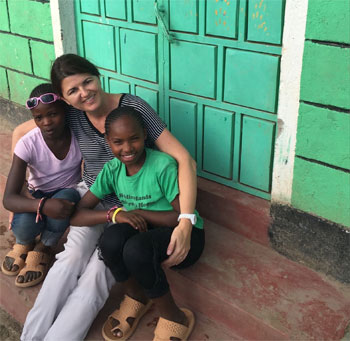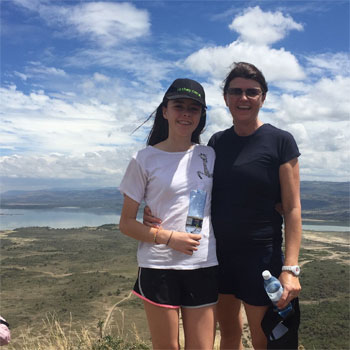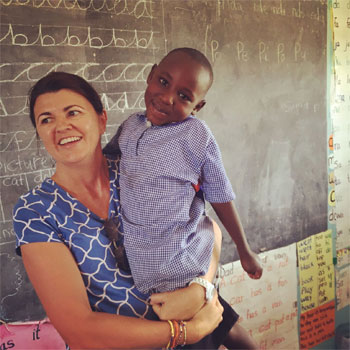Terri Anderson So They Can Interview

Terri Anderson So They Can Interview
Two years ago, Terri Anderson made a courageous career change, leaving her successful role as a lawyer to change the lives of those who need it most in a different way.
Now, Terri is one of three generations of Anderson women (along with her mum and daughter) working at So They Can (STC), a not-for-profit organisation which works with communities and their Governments in Kenya and Tanzania to educate and empower them, so they can break the poverty cycle, realise their own potential and meet their own needs.
This year, Terri entered HTC's 'Brilliant U' competition and has been awarded with the grand prize of $10,000 that will be used to feed 166 of the unsponsored children 2 meals a day at their school for an entire year.
Interview with Terri Anderson
Question: What is So They Can?
Terri Anderson: So They Can is a not-for-profit organisation registered in Australia, New Zealand, Kenya, Tanzania and the United States. We work with communities and their governments in Kenya and Tanzania to educate and empower, so they can break the poverty cycle, realise their own potential and meet their own needs.
Question: Why did you choose to help those in Kenya and Tanzania?
Terri Anderson: We started with a real interest in and passion for Africa, both our co-founders had spent time travelling in Africa. Our projects were in response to post election violence in Kenya in 2007-8. We met a community who had been displaced by the violence, who were left with nothing, they had lost family, homes, livelihoods, and they asked us for education for their children. They said to us 'the only inheritance I can give my children is an education" - we had to help.
Question: Can you tell us about some of the programs So They Can offers?
Terri Anderson: Education is at the core of everything we do, with a focus on pre-primary and primary education, and teachers. We work holistically with the community, we know for children to go to school and perform they need to be well and fed, so we support our education programs with our social initiatives. We are also working towards sustainability through our sponsorship program, and through social enterprises.
Question: What originally inspired you to leave your career as a lawyer to begin So They Can?
Terri Anderson: It was a journey, I am a founding member of So They Can, volunteering for many years. I established and ran our sponsorship program whilst continuing with my law career. Over time as we grew, the opportunity arose to apply my legal skills to our work at So They Can, and I jumped at it.
Question: What's the best part about working with your mother and daughter on So They Can?
Terri Anderson: The experiences I have at So They Can are so rich and so personal, true relationships are formed with our beneficiaries. My parents have always been amazingly supportive; they were one of the first sponsors in our sponsorship program. Mum sponsors a girl called Ann, we sponsor Gladys, a friend of Ann's. When Mum visited with me in 2012 we were welcomed into Ann's home, as family. Now every time I visit, Ann asks me of her new mum and dad in Australia and her family treats Mia (my daughter) and I, and all of my family, as part of their family. We have expanded our circle of family, and in doing so we find we as a family have received so much more than we have given.
I am really proud of both Mum and Mia. Mia is 16, her visit in October will be her fourth trip. She has entirely funded the airfares for the last two trips herself. Mum had never travelled to Africa, but leapt at the chance to travel with me to see the impact of our support, and is bravely returning in October to see Ann graduate after a year of ill health with breast cancer.
Question: What is a typical day like, for you at So They Can?
Terri Anderson: There is no typical day. Today I am in Melbourne at a round table meeting with Alice Albright, CEO of Global Partnership for Education, then off to meet some donors, then to the venue to prepare for our fundraising lunch tomorrow. Yesterday, I was on skype all afternoon with our team in Tanzania, and delivery partners at a university in Denmark. Next week I could find myself drafting a new Memorandum of Understanding, following up payments with sponsors, and sitting on the floor sorting through the hundreds of letters from sponsors we need to take over to Kenya for the children. Every day is action packed and varied.
Question: Congratulations on winning Brilliant U; what will you do with the prize money?
Terri Anderson: Thank you, we are so excited to win HTC's Brilliant U competition! The prize money of $10,000 will be used to feed 166 of the unsponsored children two meals a day at their school for an entire year – which is so incredible!
 Question: How can Australians support So They Can?
Question: How can Australians support So They Can?
Terri Anderson: One of the main ways Australians can support So They Can is by becoming a sponsor: https://www.sotheycan.org/ways-to-help/sponsor-a-child/
When you sponsor a child we will send you a photo of your sponsored child and a brief profile of the child. We invite sponsors to communicate directly with your sponsor child by exchanging letters twice a year. In turn, we send annual academic progress reports to all sponsors. There is also the opportunity to travel to Kenya on our annual working bee to meet your sponsor child.
For a monthly contribution of $50 you can provide a child with a quality education, two hot meals a day and access to clean water. At school, your support will ensure your sponsor child receives everything they need including text books, stationery, and medical care.
Question: What do you hope to achieve in the next year with So They Can?
Interview by Brooke Hunter
MORE






